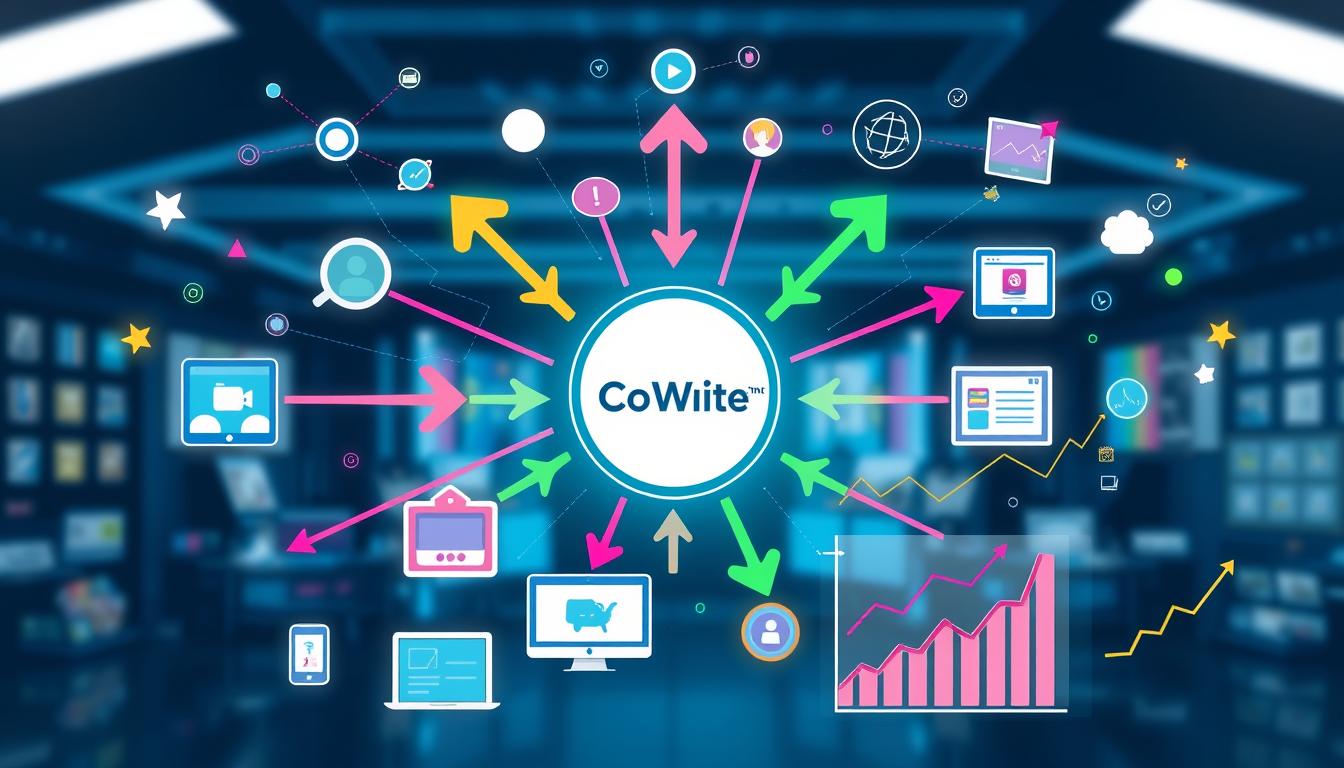To boost your search engine rankings and increase online visibility, a strong off-page SEO plan is key. A vital part of this is link building, getting high-quality backlinks from trusted sites. Using smart link building methods can make your website more credible and attract more visitors.
Boosting your online presence means understanding the role of backlink building techniques. The right strategies can help you rank better in search engines and outdo competitors. Need a Content Writing Team? Reach out via WhatsApp Call or Chat at +44-7822-010953 or +44-7874-424345 (USA Support Available).
Key Takeaways
- Understand the importance of off-page SEO for improving search engine rankings.
- Learn effective link building techniques to boost your website’s credibility.
- Discover how to leverage backlink building techniques to drive more traffic.
- Improve your online visibility by implementing the right strategies.
- Stay ahead of the competition with a robust off-page SEO strategy.
Understanding Off-Page SEO and Its Importance
To boost your website’s search engine rankings, it’s key to understand off-page SEO. Off-page SEO means doing things outside your website to make it rank better. This includes external link building and social media marketing. These tactics show search engines your website is credible and relevant.
What is Off-Page SEO?
Off-page SEO is about the actions you take outside your website to rank higher. This includes link building, social media, and more. These efforts tell search engines your site is trustworthy and valuable.
- Building high-quality backlinks from authoritative sites
- Engaging in social media to increase brand visibility
- Utilizing online directories and review sites
Why Link Building Matters
Link building is a big deal in off-page SEO. It’s about getting links from other websites to yours. High-quality backlinks from good sites make your website look better and rank higher.
- Helps search engines understand your website’s authority
- Increases referral traffic to your site
- Enhances your website’s online visibility
Key Benefits of Off-Page SEO
Off-page SEO has many benefits for a strong online presence. Some main advantages are:
- Increased credibility: Off-page SEO makes your website seem more trustworthy.
- Improved search engine rankings: Using off-site SEO tactics can help you rank higher.
- Enhanced online visibility: Off-page SEO makes your website more visible online.
Identifying High-Quality Backlink Opportunities
Finding good backlink opportunities is key to successful link building. You need to use smart link outreach methods to get building quality backlinks. We’ll look at how to find these opportunities.
Researching Competitor Backlinks
Looking at your competitors’ backlinks is a great way to start. Tools like Ahrefs and SEMrush show you who links to them. This helps you find places to get links too.
To begin, do this:
- Find your main competitors online.
- Use tools to check their backlinks.
- Notice any patterns in their links.
- Then, contact these sites to ask for a link.
Analyzing Domain Authority
Not all links are the same. The site linking to you matters a lot. Domain Authority (DA) shows how trustworthy a site is, from 0 to 100.
Choose sites with high DA scores for better links. Here’s a quick guide to DA scores:
| DA Score | Interpretation |
|---|---|
| 0-20 | Low authority, possibly spammy. |
| 21-40 | Moderate authority, might be niche or new. |
| 41-60 | Established authority, reliable. |
| 61-100 | High authority, very reliable. |
Utilizing Backlink Checkers
Backlink checker tools are vital for finding and checking links. Moz’s Link Explorer, Ahrefs, and SEMrush give you insights into your links. They also help find new ones.

Use these tools to look at DA, trust flow, and anchor text. This helps you focus on better links. It improves your site’s ranking in search engines.
Effective Guest Blogging Techniques
Guest blogging can really boost your link acquisition strategies. By posting on other respected sites, you get quality backlinks and more visibility online. It’s a great way to get more visitors and better search rankings.
Choosing the Right Blogs
To start guest blogging, find blogs that match your niche and have a good rep. Look for sites with high authority and lots of engagement. Use tools like Moz or Ahrefs to check them out. Make sure their audience and style fit your goals.
Here’s a simple table to help you evaluate blogs:
| Blog Name | Domain Authority | Audience Engagement |
|---|---|---|
| Example Blog | 50 | High |
| Another Blog | 30 | Medium |
Crafting a Compelling Pitch
After finding blogs, write a great pitch to get your post accepted. Make it personal, showing you’ve researched the blog and its audience. Show your expertise and suggest a topic that will interest their readers.
For more tips on growing your online business, check out growing your affiliate marketing business exponentially.
Creating Engaging Content
The quality of your content is key to guest blogging success. Make sure your posts are well-researched, informative, and fun to read. Use a friendly tone and add examples or stories to make it relatable.

By using these guest blogging tips, you can boost your online presence. Remember, it takes time to build a strong backlink profile. Stay consistent and patient.
Leveraging Social Media for Link Building
Social media is key in today’s digital world for link building. It helps boost your online presence and attract quality backlinks. Knowing how to use these platforms well is important.
Sharing Content Strategically
To get the most out of social media, share your content wisely. Know your audience and pick the right platforms. Post at the best times to reach more people. Share content that is valuable, relevant, and engaging to get more shares and links.
Think about what content works best on each platform. For example, infographics and videos are great on Instagram and Facebook. Make your content fit the platform to get more shares.

Engaging with Influencers
Working with influencers in your field is a smart move for links. Find influencers who like your content or niche. Build a relationship with them by consistently engaging. This can mean commenting, sharing, or working together.
When you contact influencers, make your message personal. Explain how you can help them. Offer unique content, insights, or other benefits that interest them.
Building a Community Around Your Brand
Creating a community around your brand boosts loyalty and link building. Make content that sparks conversation, like asking questions or hosting webinars. This encourages people to share and link to your content.
By growing a community, you make it more likely for your content to be shared. This natural way of building links is effective and lasts over time.
Creating Shareable Content
Creating content that resonates with your audience is key to successful link building. When you produce material that is valuable, informative, or entertaining, people are more likely to share it. This increases your online visibility and attracts backlinks.
To make your content shareable, focus on the following elements:
- Relevance: Ensure your content is relevant to your target audience.
- Quality: High-quality content is more likely to be shared.
- Emotional Connection: Content that evokes emotions tends to be shared more.
Infographics and Visuals
Infographics are a powerful tool for making complex information easily digestible and highly shareable. By incorporating visual elements like charts, graphs, and images, you can enhance the appeal of your content.
Some tips for creating effective infographics include:
- Keep it simple and focused on a single topic.
- Use high-quality images and graphics.
- Ensure your infographic is mobile-friendly.

Guides and How-Tos
Creating guides and how-to articles is another effective way to generate shareable content. These types of content are valuable because they provide step-by-step instructions or in-depth information on a particular subject.
To maximize their impact, consider the following:
- Break down complex processes into easy-to-follow steps.
- Use clear, concise language.
- Include visuals to supplement the text.
Interactive Content Ideas
Interactive content, such as quizzes, polls, and interactive infographics, can significantly boost engagement and shareability. By encouraging audience participation, you can create a more immersive experience.
Some ideas for interactive content include:
- Creating a quiz related to your industry or niche.
- Conducting a poll to gather opinions from your audience.
- Developing an interactive infographic that allows users to explore different data points.
By incorporating these strategies into your content creation process, you can increase the shareability of your content and enhance your link building efforts.
Utilizing Online Directories
Using online directories can really boost your link building. They help make your site more visible and trustworthy by listing it in the right spots.
Selecting Relevant Directories
Choosing the right directories is key. Relevance is key because it means your listing reaches the right people. Start by looking at directories that are big in your field.
- Look for directories with high domain authority.
- Check if the directory is well-maintained and updated regularly.
- Ensure the directory allows links to be followed (do-follow links).
For more tips on picking the best directories, check out this guide on online directories for link building.
Submitting Your Website Effectively
After finding good directories, it’s time to submit your site. Make sure to give all the right details about your website.
- Use a clear and concise title for your listing.
- Write a compelling description that shows what makes your site special.
- Make sure your contact info is correct and current.

Maintaining Your Listings
After you’ve submitted your site, keep your listings up to date. This keeps your info fresh and accurate.
- Check your listings often for errors or outdated info.
- Update your listings if your business or offerings change.
- Watch how your listings affect your site’s traffic.
By doing these things, you can really make the most of online directories. They help a lot with external link building and can make your site more visible online.
Networking with Industry Influencers
Link outreach methods often include working with influencers. They can help spread your content and reach more people. Building relationships with influencers can lead to quality backlinks and more visibility online.
Finding the Right Influencers
To network with influencers, first find out who they are. Look for people who are big in your field and have lots of followers. Tools like Ahrefs or SEMrush can help find influencers based on their social media and content.
Key characteristics of influencers to look for:
- Content that fits your niche
- An audience that interacts with their posts
- A strong presence on social media
Building Authentic Relationships
After finding influencers, start building real connections with them. It’s more than just asking for help when you need it. It’s about creating a win-win situation.
Tips for building authentic relationships:
- Comment, share, and like their posts.
- Share their content with your followers.
- Send personalized messages showing you’ve taken the time to understand their work.
Collaborating on Projects
Working together on projects can strengthen your bond with influencers. This can include guest blogging, webinars, or creating shared resources like eBooks or whitepapers.
| Collaboration Idea | Benefits |
|---|---|
| Guest Blogging | Reaches new audiences, builds backlinks |
| Joint Webinars | Shows off your expertise, grows your audience, gets leads |
| Shared eBooks/Whitepapers | Makes detailed resources, builds community, boosts credibility |
By networking with influencers, you boost your link building and create a network of brand promoters. They help spread your message through different channels.
Harnessing the Power of Testimonials and Reviews
Using customer feedback can boost your online presence. Testimonials and reviews increase credibility and help build quality backlinks when done right.
Encouraging Customer Feedback
To get the most from testimonials, start by asking customers to share their stories. Offer exceptional service and make it easy for them to give feedback. Send emails after a purchase or interaction, asking for a review.
Leveraging Testimonials for Links
After you collect testimonials, use them to get valuable backlinks. Contact customers who gave positive feedback and ask if they can share their experience online. This helps in building quality backlinks and grows your brand.
Promoting Your Brand through Reviews
Reviews are key to your online image. Good reviews boost your credibility and draw in new customers. Encourage happy customers to leave reviews on different platforms. Always respond to reviews, good or bad, to show you care about feedback.
By using testimonials and reviews well, you can improve your online reputation. This also helps with your building quality backlinks strategy, boosting your SEO.
Participating in Forums and Online Communities
Joining online forums and communities is a great link acquisition strategy. It helps you get high-quality backlinks and boosts your online presence. To succeed, pick the right platforms, share your knowledge, and link naturally.
Choosing the Right Platforms
Focus on forums and communities that match your niche. Find places where your audience hangs out and talks. Look for sites with good domain authority and lots of users.
For tech folks, Reddit’s r/tech or Stack Overflow are good places to start. Being in the right spots helps you build backlinks and shows you’re an expert.
Adding Value with Your Expertise
Just being there isn’t enough; you must add value. Share your knowledge, answer questions, and give insights that help others. This builds trust and shows you’re credible.
Share case studies or success stories from your field. This way, you add value and can link to your site naturally.
Including Links Naturally
When you link to your site, make it feel natural, not forced. Don’t spam links, as this can harm your site’s ranking and community standing.
Link only when it makes sense. For example, if you blog about a topic, link to it in the forum. This boosts your reputation and helps with link building.
Conducting Expert Roundups
By gathering insights from industry leaders, you can create a valuable resource that attracts links. Expert roundups involve compiling opinions, advice, or insights from a group of experts in your industry. This makes it a powerful off-page SEO strategy for link building.
Gathering Insights from Industry Leaders
To start an expert roundup, you’ll need to identify and reach out to industry leaders. You can do this by researching relevant conferences, industry reports, or social media influencers. Ensure that the experts you choose have a strong online presence to maximize the chance for backlinks.
- Research industry events and identify key speakers or attendees.
- Look for industry reports or publications featuring expert insights.
- Utilize social media platforms to find influencers in your niche.
Promoting the Final Piece
Once you’ve gathered the insights, compile them into a detailed article, infographic, or video. Promote the final piece across your channels, including your website, email newsletter, and social media profiles.
To further promote your expert roundup:
- Share it on relevant online communities or forums.
- Reach out to the experts involved and ask them to share the roundup with their networks.
- Consider guest posting on other reputable sites, referencing your roundup.
Maximizing Exposure through Social Sharing
Social sharing is key for maximizing the exposure of your expert roundup. Encourage the experts involved to share the content with their followers. Consider running a social media campaign to amplify your reach.
Some effective strategies include:
- Creating engaging social media posts that highlight key insights from the roundup.
- Utilizing relevant hashtags to increase visibility.
- Tagging the experts involved to encourage sharing.
Implementing Link Reclamation Strategies
Link reclamation can boost your website’s visibility and trustworthiness. It involves fixing broken links that point to your site or mention your brand. This approach not only strengthens your backlink profile but also improves user experience.
Identifying Broken Links
To begin with link reclamation, find broken links pointing to your site. Tools like Ahrefs, SEMrush, or Moz can scan your backlinks and spot broken ones. Regular audits are key to catch and fix these links quickly.
Contacting Webmasters for Fixes
After finding broken links, reach out to the webmasters of the sites that link to you. Write a polite and clear email about the problem and suggest a solution. Personalization is important; try to address the webmaster by name and keep your message error-free.
Monitoring Your Brand Mentions
Keeping an eye on brand mentions is vital in link reclamation. Use tools like Google Alerts or Mention to track online mentions of your brand. If you spot a mention without a link, ask the author to link to your site. This helps in building links and relationships with influencers.
| Strategy | Description | Benefit |
|---|---|---|
| Identifying Broken Links | Use tools to scan your backlink profile for broken links. | Fixing broken links improves user experience and SEO. |
| Contacting Webmasters | Reach out to webmasters to fix broken links. | Enhances backlink profile and credibility. |
| Monitoring Brand Mentions | Track online mentions of your brand. | Opportunity to request links from unlinked mentions. |
Measuring the Impact of Your Link Building Efforts
To see how well your off-page SEO works, you need to measure your link building. Use analytics tools to understand your off-site SEO’s performance.
Utilizing Analytics Tools
Google Analytics can track traffic and engagement from your link building. This data shows which strategies work best.
Key Metrics to Track
Watch organic traffic, keyword rankings, and referral traffic. These metrics show if your link building is successful. By tracking them, you can improve your online presence.
Regularly checking your link building’s impact helps you make better SEO choices. This leads to more visitors to your site.



